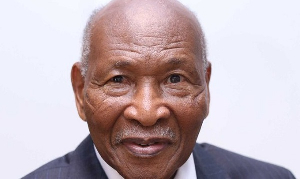- Home - News
- TWI News | TV
- Polls
- Year In Review
- News Archive
- Crime & Punishment
- Politics
- Regional
- Editorial
- Health
- Ghanaians Abroad
- Tabloid
- Africa
- Religion
- Election 2020
- Coronavirus
- News Videos | TV
- Photo Archives
- News Headlines
- Press Release
General News of Friday, 13 June 2008
Source: NDC
NDC Press Statement On Bloated Voters Register
NDC’S PRESS STATEMENT ON ELECTORAL COMMISSION’S REPORT ON THE BLOATED VOTERS REGISTER
Good Afternoon Ladies and gentlemen of the Press
We have invited you here this afternoon to deliver the NDC’s official response and comments on the “REPORT OF THE ELECTORAL COMMISSION’S COMMITTEE INTO THE DISCREPANCIES IN VOTERS’ REGISTRATION FIGURES IN ASHANTI REGION” which was released to the Political Parties on Tuesday, May 10th 2008.
Before we proceed further it may be useful to re-cap briefly the events leading to the setting up of the committee whose report is the subject under discussion.
The NDC on two different occasions requested for a copy of the current voters’ register to enable the party plan its electoral activities. On one occasion the Electoral Commission gave out a hardcopy (printed book), summaries and on the other occasion a number of compact disks of the same register.
After a careful study of the hardcopy, it was detected that the voter population figures for 13 (thirteen) constituencies in the Ashanti Region showed increases of over 100 percent between 2004 and 2006 (a period of just two years).
The Party raised an alarm publicly and demanded that the problem be rectified before the 2008 elections.
The Director of Elections of the Electoral Commission Mr. Albert Arhin swiftly reacted through various radio stations with the following claims:
1) That the figures NDC was complaining about did not exist in any official documents of the E.C.
2) That the NDC party has on no occasion officially applied for, nor received any copies of the voters’ register in whatever form from the Commission.
3) That those figures the Party was quoting were fabrications by the Party intended to mar the reputation of the Commission with the ultimate aim of disturbing the peace the country should be enjoying during the December 2008 elections.
Subsequently another political party, the Ghana Consolidated Popular Party issued a Press Statement admitting having applied for and received a similar hard copy of the Register containing the same figures the NDC was complaining about.
At this juncture, the Commission realizing that it could no longer sweep the problem under the carpet decided to undertake an internal enquiry to establish the veracity of the claim of the bloating (inflated figures) by the NDC and the G.C.P.P.
It was after the report of the Commission’s own internal enquiry confirmed that the figures were contained in the documents officially applied for and supplied to these two parties, that this second Committee whose report we are currently considering was set up.
This explains the terms of reference of the Committee which are:
· To investigate the sources of the discrepancies in the 13 constituencies in Ashanti Region Voters’ Register figures and
· To, on the basis of the findings, make the necessary recommendations to forestall future occurrences of similar nature.
It is also worth noting that the membership of this second Committee included representation of Political Parties including NDC.
Ladies and Gentlemen,
Now let us turn our attention to the report of the Committee and to assess whether it achieved what it was set up to achieve.
NDC wishes to congratulate the Committee for doing what they could in the circumstances and admitting what they could not.
FINDINGS
The Committee made 22 very useful findings of fact.
Three of the findings clearly vindicate NDC’s position. These are:
8.1 That the NDC and the office of the NDC’s Flagbearer did obtain hard copies and compact voters’ registers on CD ROM (registers without photographs) respectively from the Commission.
8.2 The GCPP requested and obtained hard copy of the voter statistics constituency by constituency from the Commission
8.3 There were discrepancies between the compact register on the CD ROMs and the hard copy summaries in respect of the following:
- 13 constituencies in the Ashanti Region
- Abnormal decreases in three constituencies in the Eastern Region over a period of two years.
Seven of the findings directly indict the competence of the Electoral Commission, six out of which relate directly to the competence of the head of I.T. Department and one to the District heads of the Commission. These are:
8.4 The Commission did not know of the discrepancies before it came in the public domain.
8.12 There were lapses in enforcing standard Data Processing/Computer Administration procedures at the I.T Department leading to the inconsistencies and variances between various statistics produced by the Department.
8.13 Of the five polling stations from five constituencies in the five districts examined, four District Electoral Officers out of the five did not reconcile the Poll Book and the ID Check List they generate with the voters’ register they receive from the head office.
8.14 There were lapses in the implementation of adequate or sufficient data validation routines and procedures in the processes of the Information Technology Department.
8.15 That there is insufficient coordination between the IT and the various departments within the Commission.
8.16 That the IT department did not provide evidence that they keep log books with respect to work done.
8.17 The Director of IT failed to recognise the magnitude of the problem caused by the discrepancies in the voters’ register.
Further 3 (three) of the findings demonstrate the result of the incompetence of the I.T Department of the Commission. These are:
8.18 I.T was found that one ID number is shared by another voter eg. Catholic primary school, Yamoransa (B040703)
.
8.19 That there were repetition of names and pictures of persons in the same register e.g. Catholic primary school, Yamoransa (B040703).
8.20 That there were also repetition of names and pictures of same bio- data in another region. E.g. There were pictures and ID numbers of voters from Mfanstiman West (Yamoransa) B040703 in the range of
16256504 – 16256999 which were added to a polling station in Takoradi (A040703) thus doubling the totals in that particular polling station.
Another finding 8.11 relates to the logistical constraint of the Electoral Commission which has been consistently hammered home by the NDC and which has been denied with the same consistency by the EC which states:
8.11 That the SQL platform does not have the capacity to support the Commission’s data base thus the voters’ register is kept in ten discrete registers.
Ladies and Gentlemen,
Two of the findings relates to how this particular issue has been handled by both the Electoral Commission and the NDC party.
8.21 The Committee found that the Commission did not handle the concerns that were raised about the voters’ register properly.
8.22 On the other hand, the Committee found the manner in which the concerns were raised, suggested lack of confidence and suspicion in the work of the Commission.
CONCLUSION
The Committee drew two main conclusions:
There were discrepancies in the Voters registration figures given out by the Commission to the NDC and the GCPP on hard copies.
The discrepancies were as a result of errors which occurred in programs used to generate the voter’s statistics. However, the Committee found the argument being canvassed by the EC that the problem was due to human error (operator error) was untenable. This was stated in 8.7 that (Operator Error) did not fully/adequately account for the observed discrepancies in the 13 constituencies”.
The current voters’ register suite of programmes deployed in the Commission has been in use since the early 1990s hence the present voter population growth cannot be handled by a system that was put in place to handle a far less voter population figure.
RECOMMENDATIONS
It is interesting to note that almost all the key recommendations made by the committee are in line with the suggestions made by the NDC over the years but which have persistently been ignored by the Commission. For example, the need for the use of conflict prevention mechanisms like IPAC and consultation between the EC and stakeholders is not new to NDC.
The following are instances where our attempts to use them has been thwarted by the Electoral Commission.
1. In the handling of ROPAB one of the NDC’s key positions was that the EC must be allowed to build consensus among the various stakeholders over the bill before it was passed into law. This was ignored.
2. After the declaration of the results of the 2004 elections, NDC requested for the final reports of the Presidential elections by polling station, this was ignored leaving the party with no option than to resort to court action.
3. When there was a court ruling about how ballot papers which are the subject of an electoral petition should be handled the NDC requested the EC to call IPAC meeting to enable parties agree on how the order could be effected without any difficulty. Again this request fell on deaf ears.
Ladies and Gentlemen,
I can recount numerous occasions when attempts by the NDC to use other means to seek solutions with the EC have been ignored. This has left us with the option of Public Statements such as this.
We wish to state that NDC is a party committed to dialogue and consensus building among stakeholders in the establishment of Electoral Rules and Processes.
It must however be emphasised that consultation and consensus building thrive best in an atmosphere of mutual respect, trust and confidence which the committee rightly finds lacking between the Electoral Commission and some of its stakeholders including the NDC.
This situation, the NDC concedes is not in the interest of the Nation, the Electoral Commission nor the NDC.
To improve this situation, the NDC puts forward the following suggestions for consideration.
1) that the Commission in collaboration with the stakeholders undertake an MIS (Management Information System) audit which would take a review of its Processes, Human Resource and IT equipment and programmes.
2) The supreme interest and security of this nation will best be served if the Electoral Commission reassigns the Director of Elections and the Head of I.T. Department is relieved of his post.
Thank you.
Johnson Asiedu Nketiah
General Secretary
12th June, 2008










